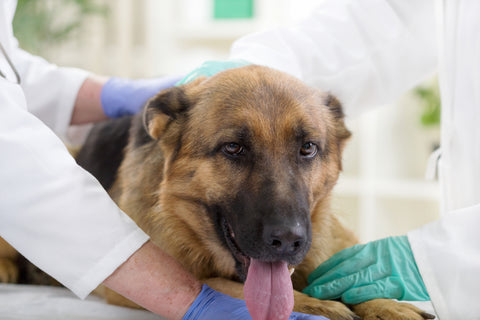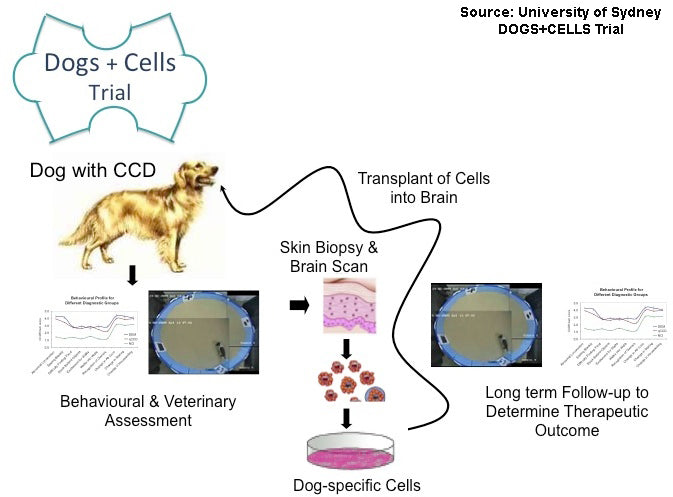Stem Cell Therapy for Senior Dogs
I am always fascinated by medical research, especially in areas that can aid our senior dogs. One of the most exciting and promising fields of study involves stem cells because it provides a way for the body to heal itself.
What are stem cells?
Stem cells occur naturally in the body and are very special because they have the ability to develop into many different types of cells including muscle, nerve, cartilage, bone, fat, liver and more. They are drawn to damaged tissues and cells in the body and then work to repair those areas. It has been discovered recently that dormant stem cells can be found in large quantities within a dog's own body fat which can be harvested, activated and then used in the treatment of various conditions often within the same day.
In the dog world, the greatest success within stem cell therapy has been found in the treatment of arthritis, fractures and soft tissue damage to joints, ligaments, cartilage and tendons. I found several vets around the globe currently offering this treatment and most boast between an 80-85% success rate, with success being based on an improvement in the dog's quality of life; better range of motion, more energy, less signs of pain and stiffness and less need or no need for anti-inflammatories.
An example of a veterinarian actively involved in stem cell therapy is Dr. Jeff Mayo of Mayo Veterinary Services based in Washington State. I had an opportunity to speak with Dr. Mayo and his passion for his work and genuine excitement over stem cell research and therapy was undeniable. His website (http://www.jeffmayodvm.com) is filled with great info on stem cells and worth checking out. The procedure his clinic uses is called the Ingeneron ARC™ which allows them to complete the treatment affordably, on-site and within one day.
In the future we are going to see stem cells used to treat a much wider range of conditions. Two areas that would directly benefit senior dogs include the use of stem cells to treat urinary incontinence (something Dr. Mayo treats on a limited basis with his procedure) and also Canine Cognitive Dysfunction, more commonly known as dog dementia, which is being explored with noticeable success in Australia.
Canine Cognitive Dysfunction (CCD) affects one in seven dogs aged ten and above and has similarities to Alzheimer's dementia in humans including memory loss, night time agitation and incontinence. Because the degeneration is linked to the death of brain cells, the use of stem cells to replenish these cells is a very exciting research avenue.
In a recent study being conducted by the University of Sydney’s Brain and Mind Centre called the Dogs = Cells Trial, scientists are going to test whether Canine Cognitive Dysfunction in older dogs can be reversed by brain transplantation of Neural Stem Cells generated from a small sample of the dog’s own skin.
Within this study they have already achieved what seems to be a miracle with one of the participating dogs, Timmy, a 13 year old Cocker Spaniel who was suffering from CCD. As part of the procedure they put Timmy under anesthetic to perform an MRI and to remove a small piece of skin from Timmy's abdomen. They then used this skin sample to harvest and grow Neural Stem Cells which were later injected into his brain. After the procedure there were follow up tests to evaluate his progress.
According to a December 2015 news release: World first: University of Sydney scientists reverse dog dementia with stem cell therapy: "Timmy’s owners reported a significant improvement in Timmy’s night-time sleeping patterns such that he was getting up only once during the night, orientating himself through the doggie door to relieve himself, then coming back on his own to his sleeping area. He was also spontaneously more affectionate with the owners and getting along better with the other dogs in the household." All things he was having difficulty doing prior to the treatment.
Excitement around this approach is also growing because a dog's brain is structurally similar to that of a human which means that any breakthroughs on the canine side could transfer over to the human world and perhaps one day help cure the growing number of seniors suffering from Alzheimer's.
While stem cells are not the cure-all for everything our dogs face as they age, it is showing more and more applications every year as research into new areas continues. The thought of helping our bodies and the bodies of our dogs rebuild themselves sounds too good to be true, but with stories like Timmy's and the success we are seeing in the treatment of arthritis, it is quickly becoming a reality and I am overwhelmed with excitement to see what lays ahead.
Ann-Marie Fleming is the Founder & CEO of Dog Quality, a provider of products focused on improving the quality of life for older dogs.


